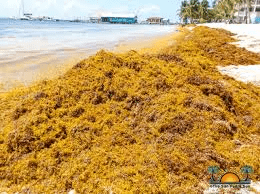
Following the State of Emergency declaration issued by Gov. Albert Bryan Jr., the Virgin Islands Water and Power Authority (WAPA) provides an overview as it relates to the authority’s management of the influx of sargassum to the region.
On St. Croix, the most notable impact has been to water production – specifically the desalination facility located next to the Richmond Power Plant and operated by our long-standing partner Seven Seas. Seven Seas produces potable water from sea water via reverse osmosis water plants on St. Croix and St. Thomas.
Potable water consumption on St. Croix averages 2.7 – 2.8 million gallons per day, and Seven Seas can produce a maximum of 3.7 million gallons per day. The influx of sargassum impacts the water plant in a number of ways, for example, blocking intake screens, and clogging strainers and filters.
Seven Seas and WAPA have been working around the clock to ensure that it is able to maintain water production. While production continues to exceed demand, the increase in sargassum has impacted the facility’s efficiency and reduced its production capacity.
As a result, Seven Seas and the authority have expeditiously implemented several strategies to help manage the volume of sargassum. These action items include: frequent filter changes, constant cleaning and monitoring of seawater intake to prevent blockage, physical removal of debris, and installation of deflection booms.
These efforts have proven to be successful as there has been a notable increase in water production over the past 48 hours.
In addition to the efforts discussed above, the WAPA has increased its regular testing of potable water to ensure it continues to meet approved Environmental Protection Agency (EPA) water quality standards. The authority has also increased the amount of water treatment and conditioning to maintain water quality. While EPA safe drinking water standards have been and will continue to be met, the public may experience instances of unfamiliar odor or colors in the water because of the sargassum in the sea water intake that the water plant is processing.
WAPA will continue to diligently monitor and evaluate the sargassum situation as it evolves because additional sargassum is forecast to affect the territory within the coming months. It also continues to work with V.I. Territorial Emergency Management Agency (VITEMA) and all its local and federal partners to not only mitigate the current situation, but also develop long-term solutions. Currently, based on present conditions, water production in the St. Thomas/St. John District remains unaffected.


